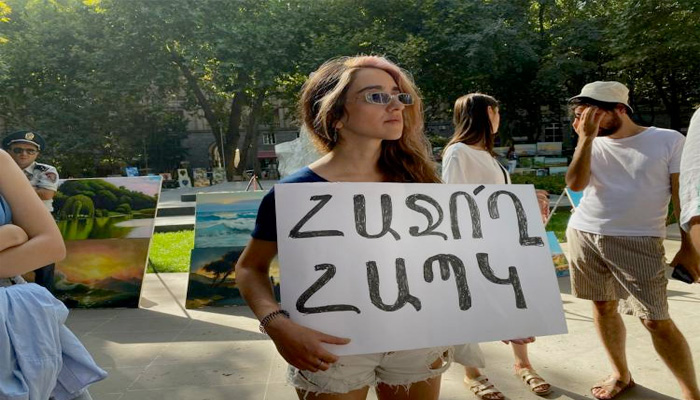Once a month, Pashinyan has a meeting with leaders of the so-called non-parliamentary parties.

The reports about those meetings do not reflect their content, because they are held in closed mode, and one can get an idea of the discussed issues only from information leaks. Their unchanging agenda is the change of Armenia’s foreign policy orientation, the final dissolution of the now formal alliance relations between Armenia and Russia, and the formalization of the alliance with the West. That agenda is close to Pashinyan’s heart, and the people who go to the meeting with him try to help with their wise advice to speed up the process and make it irreversible.
The so-called extra-parliamentary forces set a task for Pashinyan to clean the Armenian state administration system from pro-Russian and Russian-serving state officials and the Russian agency network. They demand that it starts with the government itself, Pashinyan’s entourage. Deputy Prime Minister Mher Grigoryan and Minister of Economy Vahan Kerobyan are the targets of Pashinyan’s partner parties. Not only because they know how to speak Russian and meet with Russian officials once in a while, for example, Mher Grigoryan is the co-chairman of the Russia-Armenia-Azerbaijan working group and communicates with Russian Deputy Prime Minister Overchuk within the framework of that group. Pashinyan’s fellow party leaders are convinced that these two are helping Russia to bypass Western sanctions and import some goods to Russia.
Of course, Pashinyan knows that Mher Grigoryan or Vahan Kerobyan are not pro-Russian at all, they are not pro-negotiation at all, more precisely, they are pro-money, who use public office to make money and accumulate wealth. Who has ever heard any of them express themselves in favor of improving relations with Russia or even deepening economic integration? They simply understand that now is a favorable environment to take advantage of Russia’s situation and make money, and they take advantage of the created situation. If there was such an opportunity to make money on Nicaragua or Costa Rica, they would take advantage of that opportunity with equal success, but that would not mean that they are pro-Nicaragua. Naturally, Pashinyan promises to rid the government of pro-Russians, because he does not want that his extra-parliamentary colleagues suspect him of being the beneficiary of a scheme to make money by circumventing Western sanctions against Russia. He simply says that their issues should be resolved very calmly, without excessive haste and shocks.
The next target is the power structures, more specifically, the army and the National Security Service. Pashinyan’s extra-parliamentary colleagues demand from him to clear the army and the security service from the Russian agency network, so that they do not have the opportunity to serve the enemy Russia. And how to determine if this or that person is a Russian agent or not? In this matter, they recommend using the example of Eastern Europe and the Baltic countries. In Poland, for example, employees of the Foreign Ministry who graduated from the Moscow University of Foreign Relations were fired. In the same way, it is proposed to dismiss the army and National Security Service officers in Armenia who were educated in Russian educational institutions and during that time could become Russian agents.
We don’t know what percentage of army or security service officers will be fired in that case, but there is no doubt that the number will be quite large. It is a fact that as a result of Pashinyan’s activities, there is already a large outflow of officers and a shortage in the army. It is a fact that there is neither an opportunity nor a desire to fill that gap, and after the removal of Russian-educated officers from the army, the Armenian army may disintegrate altogether. The disintegration of the Armenian army does not interest those people at all, because they are convinced that this army does not ensure the security of Armenia anyway, their hope is the USA and Europe, and the spending on the army is an unnecessary waste of funds. In this matter, the thinking of Pashinyan and his extra-parliamentary entourage is completely consistent.
Pashinyan and his extra-parliamentary colleagues are united by the ideological commonality of fighting against Russia at all costs. The only difference is that Pashinyan is against the abrupt termination of cooperation with Russia, because he will lose hundreds of millions of income, and non-parliamentarians do not benefit from this cooperation. On the contrary, they feed on the plans to carry out anti-Russian propaganda in Armenia and do everything to show that the money they receive is equivalent to the work done. As they say, mutually beneficial cooperation has been established.
We will look at other details and directions of cooperation in the near future.
Avetis Babajanyan
Ամբողջական հոդվածը կարող եք կարդալ այս հասցեով՝ : https://hraparak-am.translate.goog/post/39c208db96cfcc90411205283e96c5b3?_x_tr_sl=hy&_x_tr_tl=en&_x_tr_hl=en&_x_tr_pto=nui,sc
© 2008 – 2021 «Հրապարակ օրաթերթ»
